By Beverly Guy-Sheftall
October 27, 2014
Dear Toni:
Over the past fourteen years, at the Women’s Center’s annual Toni Cade Bambara Scholar-Activism Conference, we have gathered in March (Women’s History Month) to remember and celebrate your extraordinary life and legacy as a radical Black feminist writer/ filmmaker/ activist/ visionary. So, every year beginning in 2001, I have penned a brief love note—a praisesong—as I reflected on our friendship and your profound impact on my intellectual/ political development.
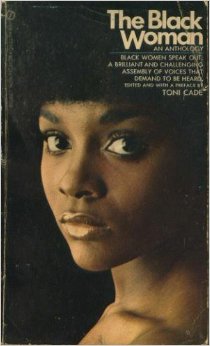 It all began in 1974, four years after you published The Black Woman, which is now a Black feminist canonical text that is still read, revered, and kept in print!!! Your “Preface” to the anthology and your essay “On the Issue of Roles” are as timely, as urgent, as brilliant, as provocative as they were in 1970, and I include them in my Feminist Theory class every spring. Your twelve point “blueprint” for liberation and the work we must do as “revolutionary” Black women is unparalleled. I just pulled my tattered copy off my bookshelf and reread out loud my favorite lines from “Roles,” which are:
It all began in 1974, four years after you published The Black Woman, which is now a Black feminist canonical text that is still read, revered, and kept in print!!! Your “Preface” to the anthology and your essay “On the Issue of Roles” are as timely, as urgent, as brilliant, as provocative as they were in 1970, and I include them in my Feminist Theory class every spring. Your twelve point “blueprint” for liberation and the work we must do as “revolutionary” Black women is unparalleled. I just pulled my tattered copy off my bookshelf and reread out loud my favorite lines from “Roles,” which are:
Revolution begins with the self, in the self; We’d better take the time to fashion revolutionary selves, revolutionary lives, revolutionary relationships;’
and
Not all speed is movement!!!
As a teacher, I also like
Mapping out a building takeover when your term paper is overdue and your scholarship is under review is not revolutionary.
And I still laugh about,
Ain’t no such animal as an instant guerrilla.
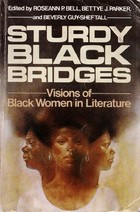 I still remember, as if it were yesterday, coming to your home in 1974 in Atlanta—very nervous, very inexperienced, very intimidated—for my interview with you, which was published in my first book (with Roseann P. Bell) as “Commitment: Toni Cade Bambara Speaks.” You will be happy to know that your dear friends Linda Janet Holmes and Cheryl A. Wall reprinted the interview, “Toni Cade Bambara: Black Feminist Foremother,” in their extraordinary book Savoring the Salt: The Legacy of Toni Cade Bambara, and I wrote a new introduction for it. You will also be pleased with A Joyous Revolt, Linda’s newly released biography of you, which is a love offering to the world!!
I still remember, as if it were yesterday, coming to your home in 1974 in Atlanta—very nervous, very inexperienced, very intimidated—for my interview with you, which was published in my first book (with Roseann P. Bell) as “Commitment: Toni Cade Bambara Speaks.” You will be happy to know that your dear friends Linda Janet Holmes and Cheryl A. Wall reprinted the interview, “Toni Cade Bambara: Black Feminist Foremother,” in their extraordinary book Savoring the Salt: The Legacy of Toni Cade Bambara, and I wrote a new introduction for it. You will also be pleased with A Joyous Revolt, Linda’s newly released biography of you, which is a love offering to the world!!
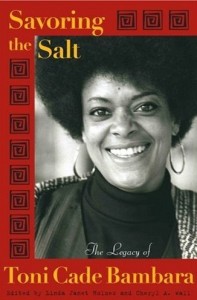 In that introduction, I wanted to capture the profound impact you had on young Black women like myself (and bell hooks), who were perceived to be race traitors because of our embrace of feminism at a time when the “F” word was being demonized. You may remember that when I asked you—rather naively—whether it was a dilemma for you to be both a feminist and a warrior in the race struggle, you responded, with such ease:
In that introduction, I wanted to capture the profound impact you had on young Black women like myself (and bell hooks), who were perceived to be race traitors because of our embrace of feminism at a time when the “F” word was being demonized. You may remember that when I asked you—rather naively—whether it was a dilemma for you to be both a feminist and a warrior in the race struggle, you responded, with such ease:
I don’t find any basic contradiction or any tension between being a feminist, being a pan-Africanist, being a black nationalist, being an internationalist, being a socialist, and being a woman in North America.
When you shared with me your involvement in what we would now call a global women’s movement, I was stunned, especially when I learned that a year later you would travel to North Vietnam having been invited by their Women’s Union with a delegation called the North American Academic Marxist-Leninist Anti-Imperialist Feminist Women!!!
When I left your home at age 28, where I met your young daughter Karma Bene for the first time, I desperately wanted to be like you—bold, self-assured, down-to-earth, funny, brilliant, sophisticated, a world traveler, comfortable in my own skin, connected to Black communities, unapologetically feminist. Forty years later, I can’t imagine who I would have become, Toni, were you not in my life, even after you left us.
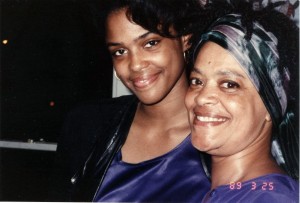
Toni Cade Bambara and her daughter
Karma Bene Bambara Smith
courtesy: Karma Smith and The Spelman Archives
So, five years after you joined the ancestors, the Women’s Center calls your name and honors your work. We celebrate with your friends, comrades, students, community organizers, professors, filmmakers, writers, agitators, and your daughter, Karma Bene Bambara Smith, and her growing family. We are deeply indebted to Karma for the precious gift of your personal papers, which she donated in 2004 to the Spelman College Archives and the Women’s Center manages them. Linda Janet Holmes helped persuade her that Spelman would be a good home, and you will be pleased to know that your papers are in good company, since we also have the papers of sister-warriors Audre Lorde and Johnnetta Cole.
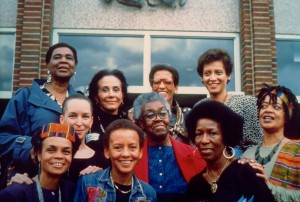
“Sistren: Black Women Writers at the Inauguration of Sister President Johnnetta B. Cole” 1988.
Top Row: Louise Meriwether, Pinkie Gordon Lane, Johnnetta Cole and Paula Giddings. Middle Row: Pearl Cleage, Gwendolyn Brooks and Toni Cade Bambara. Bottom Row: Sonia Sanchez, Nikki Giovanni and Mari Evans
photo credit: Susan J. Ross. ©1988
Finally, you remain with us in very profound ways, and I see you every time I enter the space!!! Susan J. Ross’s individual photograph of you hangs in the Center, as well as the group photo of Black women writers who gathered for Johnnetta Cole’s inauguration as the first Black woman president of Spelman in 1987; the Toni Cade Bambara Collective students meet almost every Friday; scholars come from all over the place to visit your papers; a documentary by your brother/friend
Louis Massiah is in the works; I smiled visiting with him and Karma a few weeks ago in the Archives, as we viewed some of your amazing tapes, and I was able to see you and hear your voice again; a book signing of the Holmes biography will take place on Friday in the Women’s Center Meeting Room.
I would never have been able to imagine on that beautiful spring day in Atlanta when you greeted me at your back door that you would stay with me forever. The Center loves you deeply.
in gratitude and friendship,
Beverly
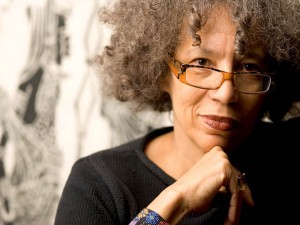 Beverly Guy-Sheftall, Ph.D., is founding director of the Women’s Research and Resource Center (since 1981) and Anna Julia Cooper Professor of Women’s Studies at Spelman College. She was for many years an adjunct professor at Emory University’s Institute for Women’s Studies, where she taught graduate courses in their doctoral program. Dr. Guy-Sheftall has published a number of texts within African American and Women’s Studies, which include the first anthology on Black women’s literature, Sturdy Black Bridges: Visions of Black Women in Literature, which she co-edited with Roseann P. Bell and Bettye Parker Smith; her dissertation, Daughters of Sorrow: Attitudes Toward Black Women, 1880-1920; and Words of Fire: An Anthology of African American Feminist Thought. Additional anthologies include Traps: African American Men on Gender and Sexuality, co-edited with Rudolph P. Byrd; I Am Your Sister: Collected and Unpublished Writings of Audre Lorde, with Rudolph P. Byrd and Johnnetta Betsch Cole; and Still Brave: The Evolution of Black Women’s Studies, co-edited with Stanlie James and Frances Smith Foster. She has also completed with Johnnetta Betsch Cole a monograph, Gender Talk: The Struggle for Equality in African American Communities, and Who Should Be First?: Feminists Speak Out on the 2008 Presidential Election. In 1983, she became founding editor of Sage: A Scholarly Journal on Black Women, which was devoted exclusively to the experiences of African descent.
Beverly Guy-Sheftall, Ph.D., is founding director of the Women’s Research and Resource Center (since 1981) and Anna Julia Cooper Professor of Women’s Studies at Spelman College. She was for many years an adjunct professor at Emory University’s Institute for Women’s Studies, where she taught graduate courses in their doctoral program. Dr. Guy-Sheftall has published a number of texts within African American and Women’s Studies, which include the first anthology on Black women’s literature, Sturdy Black Bridges: Visions of Black Women in Literature, which she co-edited with Roseann P. Bell and Bettye Parker Smith; her dissertation, Daughters of Sorrow: Attitudes Toward Black Women, 1880-1920; and Words of Fire: An Anthology of African American Feminist Thought. Additional anthologies include Traps: African American Men on Gender and Sexuality, co-edited with Rudolph P. Byrd; I Am Your Sister: Collected and Unpublished Writings of Audre Lorde, with Rudolph P. Byrd and Johnnetta Betsch Cole; and Still Brave: The Evolution of Black Women’s Studies, co-edited with Stanlie James and Frances Smith Foster. She has also completed with Johnnetta Betsch Cole a monograph, Gender Talk: The Struggle for Equality in African American Communities, and Who Should Be First?: Feminists Speak Out on the 2008 Presidential Election. In 1983, she became founding editor of Sage: A Scholarly Journal on Black Women, which was devoted exclusively to the experiences of African descent.
Dr. Guy-Sheftall is the recipient of numerous fellowships and awards, among them a National Kellogg Fellowship, a Woodrow Wilson Fellowship for dissertations in Women’s Studies, and Spelman’s Presidential Faculty Award for outstanding scholarship. She is a member of the Board of Trustees at Dillard University in New Orleans, Louisiana. She has been involved with the national women’s studies movement since its inception and provided leadership for the establishment of the first women’s studies major at a historically Black college. From 2009 through 2011, Dr. Guy-Sheftall served as president of the National Women’s Studies Association (NWSA). Beyond the academy, she has been involved in a number of advocacy organizations, which include the National Black Women’s Health Project, the National Council for Research on Women, and the National Coalition of 100 Black Women, on whose boards she serves. In her role as Director of Spelman’s Women’s Center, she has also been involved with the development of student activism around misogynist images of Black women in hip hop, as well as a broad range of social justice issues, including reproductive rights and violence against women. She teaches women’s studies courses, including feminist theory and global Black feminisms.
You may also like...
1 Comment
All Content ©2016 The Feminist Wire All Rights Reserved

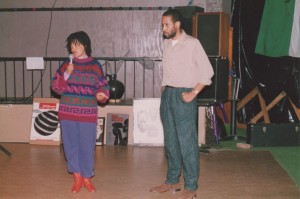



Pingback: Afterword: Toni Cade Bambara's Living Legacy - The Feminist Wire | The Feminist Wire